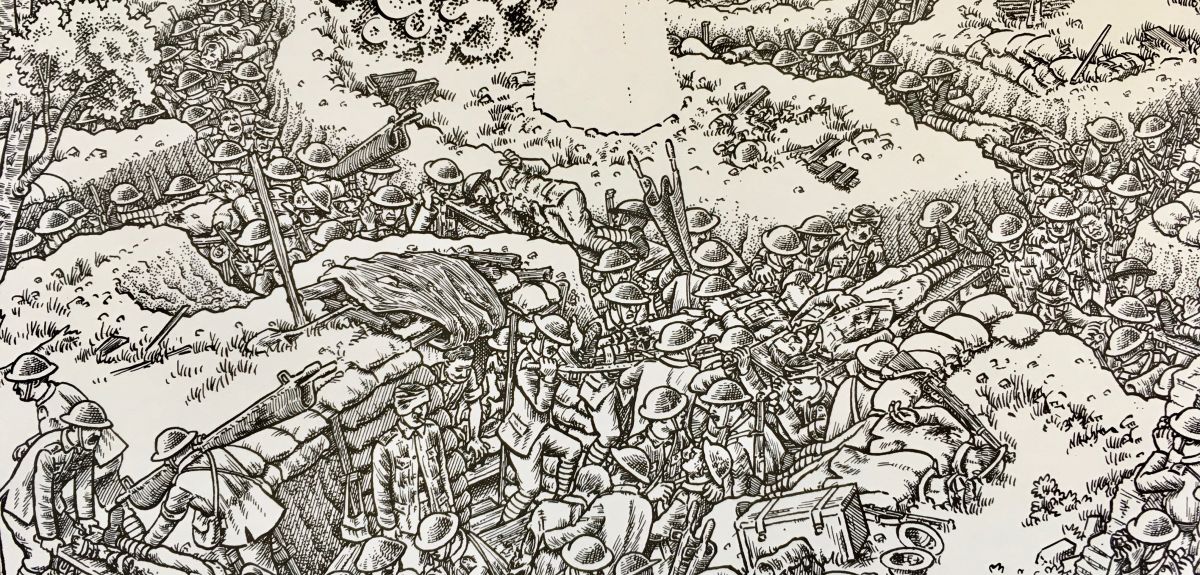
Image credit: Joe Sacco
‘Drawing War’: seminar to explore links between art, war and memory
Cultures and Commemorations of War is an interdisciplinary seminar series that explores the practices and politics of war memory across time. Organised by Dr Alice Kelly, Harmsworth Postdoctoral Research Fellow at Oxford’s Rothermere American Institute, the series was initially funded by a British Academy Rising Stars Engagement Award.
The next event, held on Thursday 9 May, is the fifth in the series and focuses on the interplay between art, war and memory, with a keynote speech from the renowned graphic novelist Joe Sacco. Dr Kelly, who is also a Junior Research Fellow at Corpus Christi College, Oxford, talks to Arts Blog about the event...
What topics will this seminar explore?
The purpose of this interdisciplinary seminar is to explore the artistic and visual representation of war in many different contexts. Over the course of the day, we will hear from a range of academics (from professors to PhD students), artists and practitioners working on the artistic representation and memory of many different conflicts. In the morning there will be short talks on a new First World War video game, on art after Auschwitz, and on the political cartoons of the Palestinian cartoonist Naji Al-Ali (assassinated in 1987). In the afternoon we will hear about a project which links the Belgian refugee crisis in the First World War with contemporary refugees, and a project to photograph murals in Northern Ireland through the Troubles.
What role does art play in the representation of war?
Art and war have a complex relationship. In one way, the two are opposite: art is creative, war is destructive, but obviously it’s more complicated than that. Art, perhaps more than other media, has an immediacy which makes it highly effective in telling the story of a war. Art in wartime can promote war through propaganda, or it can protest against war. War inspires art, but it can also be looted in wartime or destroyed by war – think of, in recent times, the temples destroyed in Palmyra, Syria. Art can enable us to remember violence, recording the experience of people who may be forgotten by the historical record, and to rewrite the history of war, but it can also facilitate the forgetting of violence by censorship and photo manipulation. After a war, art can enable people to recover. There are also the complicated ethics of war art – what can be depicted and what can’t? What is reportage and what is exploitation? What constitutes ‘war art’? We’ll be thinking about some of these issues at our seminar.
Tell us about Joe Sacco’s significance in this area.
Joe is an award-winning cartoonist who combine eyewitness journalism and art, and is a pioneer within the genre of comics journalism. He is particularly known for representing conflict and violence, and their cultural and social memory. Some of his best-known books, for example Palestine (2001) and Footnotes in Gaza (2009), have focused on the Israel-Palestine conflict, while in books such as Safe Area Goražde he focuses on the Bosnian War. His epic 24-foot depiction of the first day of the Battle of the Somme, called The Great War (2013), should be seen by everyone thinking about the war. The scope of Joe’s reportage and his ability to provide panoramic scenes while paying meticulous attention to detail, combined with his humane and sensitive journalism, constitute a body of work which exemplifies the key themes of this CultCommWar seminar.
What else have you covered in this seminar series?
This is the fifth workshop in the seminar series. Our previous four events have covered a wide range of topics related to the practices and politics of war memory across time. In the first year, the series was funded by a British Academy Rising Stars Public Engagement Fellowship. In the two events held in Oxford and one at Imperial War Museum London, our keynote speakers were the journalist and writer David Rieff, the academic Marita Sturken, and the Turner Prize-winning artist Jeremy Deller (who told us about the process of creating We’re Here Because We’re Here, his Somme centenary piece). Our first event this academic year focused on American wars and American memory, and featured the anthropologist Sarah Wagner. Across the series, our conversations have considered the myriad ways that war has been remembered in unofficial and official contexts, from video games to baseball caps (shared between Vietnam vets); from old and new memorials to volunteers dressed as soldiers in Paddington station.
Most of the events feature a morning roundtable led by postgraduates and early career researchers, where the chairs are set in a circle to encourage an open and democratic exchange of ideas. I wanted to move away from the set structure of a conference and I think of these events more like a kind of thinktank, where audience members are encouraged to participate as much as possible.
You can read short pieces about the series on the British Academy website and the Oxford Arts Blog, and I wrote a short article for Times Higher Education on how the series particularly champions emerging and early career scholars in these types of events.
There are still a few places available at the event:
To register for the full-day workshop, please click here.
To register ONLY for the talk by Joe Sacco, please click here.